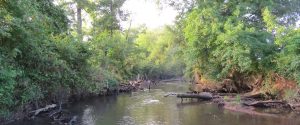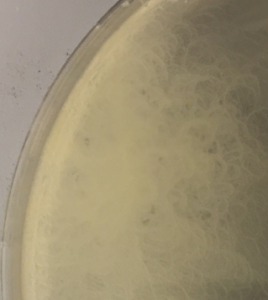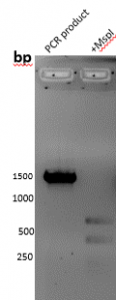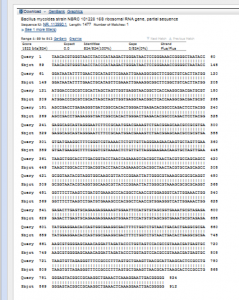Bacillus mycoides is a gram-positive bacteria that can be found mainly in soil but also in water. It is a non-motile bacteria collected by Di Franco and associates at the Sapienza University of Rome Genetics and Molecular Biology department garden. Colonies were isolated for further knowledge about formation of shape and the genetics behind it.
References
Di Franco C, Beccari E, Santini T, Pisaneschi G, Tecce G. 2002. Colony shape as a genetic trait in the pattern-forming Bacillus mycoides. BMC Microbiology [Internet]. [cited 30 March 2017];2. Available from http://www.biomedcentral.com/1471-2180/2/33.
Data collection: February 9, 2017
Methods for isolation and identification:
- Fifty milliliters of water was collected from the surface of Buffalo Creek in Lancer Park (Figure 1). A sterile swab was mixed in the water and spread across a sterile LB agar plate. Serial dilutions made from the direct count sample of 1:10 and 1:100 were plated on sterile LB agar plate using a sterile swab for each. The plates were incubated at 30 degrees Celsius for 25 hours.
- A cream colored colony that was ‘frilly’ in appearance (Figure 2) was selected for 16S rRNA gene sequencing by PCR amplification.
- The PCR product was digested with MspI and sequenced to identify the genus and species of the bacteria.
Figure 1. Flowing sample collection site

Figure 2. Isolated colony used for identification

Results
- MspI Digestion of isolated colony: after polymerase chain reaction digestion was conducted base pairs were found roughly at; 500 bp 250 bp and extremely subtle at 150 bp (Figure 3).

Figure 3. Results of MspI digestion and PCR amplification.
- Sequence analysis (Figure 4): The sequenced PCR product generated 825 bases of high-quality reads that were used to identify the genus and species of the colony. The chromatogram of the sequence is available as a pdf (flowing site chromatogram.pdf) NCBI BLAST analysis revealed 100% identity with bases 89-912 of the 16s rRNA gene of Bacillus mycoides.

Figure 4. NCBI BLAST analysis of colony 3F
Contributed by: Tori Acosta, BIOL 250 Spring 2017, Group 3